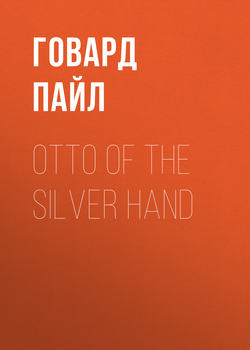Читать книгу Otto of the Silver Hand - Говард Пайл - Страница 6
V. How Otto Dwelt at St. Michaelsburg
ОглавлениеSo the poor, little, motherless waif lived among the old monks at the White Cross on the hill, thriving and growing apace until he had reached eleven or twelve years of age; a slender, fair-haired little fellow, with a strange, quiet serious manner.
“Poor little child!” Old Brother Benedict would sometimes say to the others, “poor little child! The troubles in which he was born must have broken his wits like a glass cup. What think ye he said to me to-day? ‘Dear Brother Benedict,’ said he, ‘dost thou shave the hair off of the top of thy head so that the dear God may see thy thoughts the better?’ Think of that now!” and the good old man shook with silent laughter.
When such talk came to the good Father Abbot’s ears, he smiled quietly to himself. “It may be,” said he, “that the wisdom of little children flies higher than our heavy wits can follow.”
At least Otto was not slow with his studies, and Brother Emmanuel, who taught him his lessons, said more than once that, if his wits were cracked in other ways, they were sound enough in Latin.
Otto, in a quaint, simple way which belonged to him, was gentle and obedient to all. But there was one among the Brethren of St. Michaelsburg whom he loved far above all the rest – Brother John, a poor half-witted fellow, of some twenty-five or thirty years of age. When a very little child, he had fallen from his nurse’s arms and hurt his head, and as he grew up into boyhood, and showed that his wits had been addled by his fall, his family knew not what else to do with him, and so sent him off to the Monastery of St. Michaelsburg, where he lived his simple, witless life upon a sort of sufferance, as though he were a tame, harmless animal.
While Otto was still a little baby, he had been given into Brother John’s care. Thereafter, and until Otto had grown old enough to care for himself, poor Brother John never left his little charge, night or day. Oftentimes the good Father Abbot, coming into the garden, where he loved to walk alone in his meditations, would find the poor, simple Brother sitting under the shade of the pear-tree, close to the bee-hives, rocking the little baby in his arms, singing strange, crazy songs to it, and gazing far away into the blue, empty sky with his curious, pale eyes.
Although, as Otto grew up into boyhood, his lessons and his tasks separated him from Brother John, the bond between them seemed to grow stronger rather than weaker. During the hours that Otto had for his own they were scarcely ever apart. Down in the vineyard, where the monks were gathering the grapes for the vintage, in the garden, or in the fields, the two were always seen together, either wandering hand in hand, or seated in some shady nook or corner.
But most of all they loved to lie up in the airy wooden belfry; the great gaping bell hanging darkly above them, the mouldering cross-beams glimmering far up under the dim shadows of the roof, where dwelt a great brown owl that, unfrightened at their familiar presence, stared down at them with his round, solemn eyes. Below them stretched the white walls of the garden, beyond them the vineyard, and beyond that again the far shining river, that seemed to Otto’s mind to lead into wonder-land. There the two would lie upon the belfry floor by the hour, talking together of the strangest things.
“I saw the dear Angel Gabriel again yester morn,” said Brother John.
“So!” says Otto, seriously; “and where was that?”
“It was out in the garden, in the old apple-tree,” said Brother John. “I was walking there, and my wits were running around in the grass like a mouse. What heard I but a wonderful sound of singing, and it was like the hum of a great bee, only sweeter than honey. So I looked up into the tree, and there I saw two sparks. I thought at first that they were two stars that had fallen out of heaven; but what think you they were, little child?”
